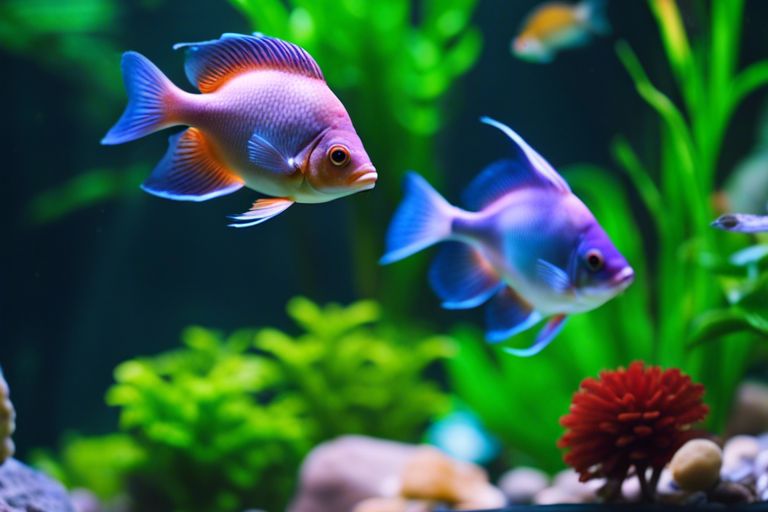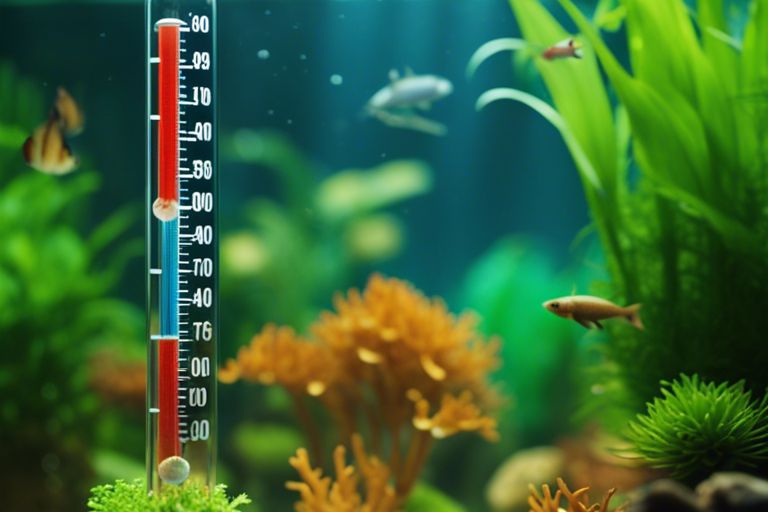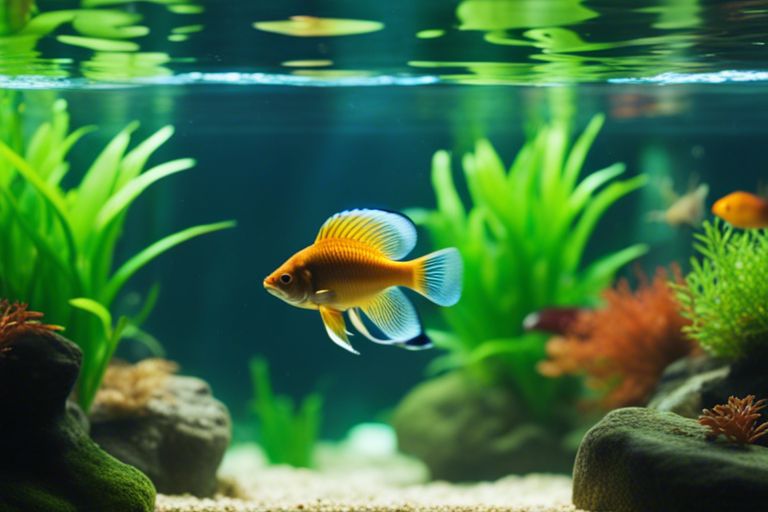It goes without saying that the quality of water in which fish reside plays a crucial role in their overall health and well-being. Just like how SUVs dominate the American automotive landscape, water quality dominates the aquatic world, with variations in temperature, pH levels, oxygen levels, and pollutants all affecting the ability of fish to thrive. In this informative blog post, we’ll investigate into the key factors that contribute to water quality and how they impact the health of our aquatic friends.

Water Quality Essentials
Chemical Factors
For optimal fish health, it is crucial to understand the chemical factors that play a crucial role in water quality. Key chemical factors to monitor include pH levels, ammonia, nitrites, and nitrates. These factors can directly impact the health and well-being of your aquatic pets.
- Monitor pH levels regularly to ensure they remain within the appropriate range for your fish species.
- Ammonia levels should be kept at zero, as any presence of ammonia can be harmful to fish.
- Nitrite and nitrate levels should also be closely monitored to prevent toxicity and stress on fish.
Assume that any imbalance in these chemical factors can lead to serious health issues for your fish. Regular water testing and proper maintenance are crucial for maintaining a healthy aquatic environment.
Physical Factors
Quality water for fish health also depends on physical factors such as temperature, oxygen levels, and water flow. These factors are crucial for ensuring a thriving aquatic ecosystem for your fish.
- Maintain a stable water temperature that is suitable for your fish species to thrive.
- Ensure proper oxygenation of the water to support the respiratory needs of your fish.
- Water flow is important for distributing oxygen and nutrients evenly throughout the aquarium.
Any fluctuations in these physical factors can impact the overall well-being of your fish. It is crucial to create a balanced environment that meets the specific requirements of your aquatic pets.
Nitrite
- Nitrite is a byproduct of the breakdown of ammonia in the nitrogen cycle.
- High levels of nitrite can be toxic to fish, leading to health issues and even death if not addressed promptly.
- Regular water testing and proper filtration are crucial for preventing nitrite buildup in your aquarium.
Biological Factors in Water Quality
Once again, when evaluating water quality in a fish tank, we must consider the biological factors that directly impact the overall health of the aquatic environment. These factors play a crucial role in maintaining a balanced ecosystem for the fish to thrive.
Beneficial Bacteria and Bioload
To ensure a healthy environment for fish, beneficial bacteria are necessary in breaking down harmful substances such as ammonia and nitrites produced by fish waste. These bacteria help in maintaining a stable nitrogen cycle, which is crucial for the overall well-being of the aquatic inhabitants. Keeping a balanced bioload is important to ensure that the beneficial bacteria can efficiently process the waste generated in the tank.
Algae and Plant Life
One of the key biological factors in water quality is the presence of algae and plant life in the aquarium. Algae not only provide oxygen through photosynthesis but also serve as a food source for some fish species. In addition, live plants play a crucial role in oxygenating the water, absorbing excess nutrients, and providing shelter for fish, contributing to a healthy and natural ecosystem.
Another important aspect of algae and plant life is their ability to outcompete harmful algae species, preventing algae blooms that can negatively impact water quality. Proper maintenance and balance of plant and algae growth are necessary in creating a healthy aquatic environment for fish.

Water Quality Management Techniques
Filtration Systems
Quality filtration systems are important in maintaining optimal water quality in aquariums. They work by removing physical and chemical waste products from the water, ensuring a clean and healthy environment for fish to thrive in. There are various types of filtration systems available, including mechanical, biological, and chemical filtration, each playing a crucial role in keeping the water pristine.
Water Change Strategies and Aeration Techniques
On top of using filtration systems, regular water changes and proper aeration techniques are key components of effective water quality management in fish tanks. Water changes help remove accumulated toxins and replenish important minerals, promoting a balanced ecosystem for your aquatic pets. Aeration techniques, such as air stones and water pumps, aid in oxygenating the water, which is vital for the well-being of fish and other aquatic inhabitants.
With proper water change strategies and aeration techniques in place, along with quality filtration systems, you can create a stable and healthy aquatic environment for your fish to thrive and flourish.

Monitoring and Testing
Regular Water Testing Protocols
On your journey to maintain optimal water quality for your fish, it is crucial to establish regular water testing protocols. Regular testing allows you to monitor key parameters such as pH, ammonia levels, nitrite levels, and nitrate levels, which are important for the overall health and well-being of your aquatic pets.
Understanding Test Results and Taking Action
Testing your water is only half the battle; understanding the results and taking appropriate action is equally important. When interpreting test results, pay close attention to any deviations from the ideal range for each parameter. If levels are outside the recommended range, be prepared to take swift corrective action to prevent any negative impact on your fish.
Monitoring your fish tank’s water quality is a continuous process that requires vigilance and prompt action when necessary. Regular testing coupled with an understanding of the results will empower you to make informed decisions that promote a healthy aquatic environment for your beloved fish.
Addressing Common Problems
Alleviating Stress from Poor Water Conditions
Despite fish being resilient animals, they can still suffer from stress when exposed to poor water conditions. Any sudden change in water temperature, pH levels, or oxygen levels can put stress on fish, leading to health issues and even death.
Treatment and Prevention of Water Quality Issues
The treatment and prevention of water quality issues are crucial to maintaining a healthy aquatic environment for fish. The key is to proactively monitor water parameters such as ammonia, nitrite, nitrate, and pH levels. The sooner any imbalances are detected, the easier it is to rectify the situation.
To ensure optimal water quality, regular water changes, proper filtration, and adequate aeration are vital. It is also important to avoid overfeeding fish, as uneaten food can lead to an increase in ammonia levels. By staying vigilant and taking proactive measures, fish keepers can prevent common water quality issues and provide a healthy environment for their aquatic pets.
Conclusion
Taking this into account, understanding water quality is crucial for maintaining fish health. Water parameters such as temperature, pH, ammonia levels, and oxygen content play a crucial role in the well-being of aquatic organisms. By monitoring and ensuring proper water quality conditions, fish owners can create a healthy environment for their aquatic companions, reducing the risk of diseases and promoting overall well-being.
FAQ
Q: Why is water quality important for fish health?
A: Water quality is crucial for fish health because it directly impacts their overall well-being, growth, and disease resistance. Poor water quality can stress fish and make them more susceptible to illnesses.
Q: What are the key parameters that determine water quality for fish?
A: The key parameters for water quality in fish include temperature, pH levels, dissolved oxygen, ammonia, nitrites, nitrates, and water hardness.
Q: How does temperature affect water quality for fish?
A: Temperature plays a critical role in fish health as it affects their metabolism, immune system, and stress levels. Sudden or extreme temperature changes can be harmful to fish.
Q: Why is pH important in maintaining water quality for fish?
A: pH levels determine the acidity or alkalinity of water, which can impact fish respiration, nutrient uptake, and overall health. Most fish species have specific pH range preferences.
Q: What is dissolved oxygen and why is it necessary for fish health?
A: Dissolved oxygen is important for fish respiration. Adequate levels of oxygen in water are necessary to ensure that fish can breathe properly and carry out their metabolic functions efficiently.
Q: How do ammonia, nitrites, and nitrates affect water quality for fish?
A: Ammonia, nitrites, and nitrates are byproducts of fish waste and decaying organic matter. High levels of these compounds can be toxic to fish, causing stress, illness, and even death if not properly managed.
Q: What role does water hardness play in maintaining water quality for fish?
A: Water hardness refers to the mineral content in water, specifically calcium and magnesium. It can impact fish health by affecting osmoregulation, egg development, and overall fish growth and vitality.











